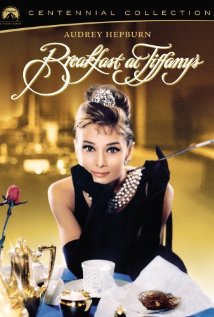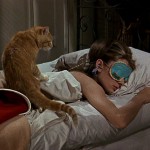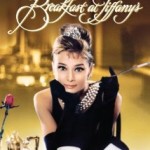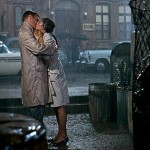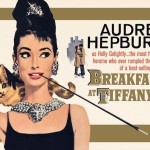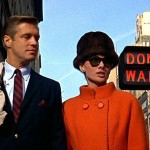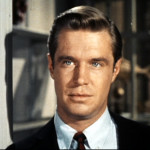Breakfast at Tiffany’s is a slight but iconic movie based on a slight but iconic novella by Truman Capote. That it is such a charismatic movie speaks volumes for both its raw ingredients, chief among which is THAT song. Moon River is a towering film song, one for which Henry Mancini won the most deserved Oscar in movie history.
Any film would have triumphed for having that song as its theme, so Blake Edwards (renowned mostly, of course, for the Pink Panther series) could barely go wrong with the film. Or could he? In many ways BaT as filmed is not at all what it purports to be. Romantic? Definite tear-jerker almost every time! But comedy? Nope! Frankly Mickey Rooney‘s faux-Japanese act makes me cringe rather than laugh.
OK, so forget the RomCom bit and instead focus on the fact that this is a movie from a book tiptoeing around a delicate and sensitive subject for the 60s, namely a high class escort who moves in very high class circles while trying to find an eligible bachelor to marry.
Holly Golightly is actually a complex and sophisticated character in the guise of a neurotic and ditzy young woman. That Audrey Hepburn can carry it off speaks volumes for her often understated acting capabilities, hinting at the dark side of her life while keeping up a monologue about her airs and graces. Maybe she was the thinking man’s Monroe, elegant, oozing charm, but with a multi-faceted personality that went deeper than usually required in her movies.
George Peppard‘s Paul Varjak is himself a prostitute of sorts, a “kept” man who does the bidding of a rich older woman, thereby a counterpoint to Hepburn’s good time Golightly. The movie makes no moral judgements of either, though arguably it should be harsher on Peppard, rather than emphasising his matinée idol good looks.
For all of the showbiz razzamatazz on display here, the plot consists largely of a gradual unpeeling of the layers of Golightly’s persona via grand satire on a 60s “with it” party, her departure and the eventual, inevitable loving reunion with Varjak (and the cat) in pouring rain. It is almost by the by, and deliberately so. Some layers remain hidden because Edwards wanted, in the final analysis, to send his audience home with warm smiles plastered on their collective faces.
For the audience the reunion is a heartwarming moment, and for a while at least the subtleties of Capote’s text go by the board: Breakfast at Tiffany’s lite, maybe, but still as charismatic for all of that. Perhaps with our enhanced sensibilities the sensitivity of the subject matter has long gone too, so we can simply enjoy it at face value… which is probably no bad thing.

